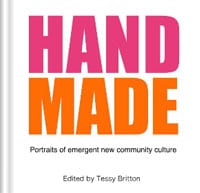
 I settled down this morning to have a proper read-through Mindapples Co-founder Tessy Britton’s new book, Hand Made, and feel inspired to write a post about it.
I settled down this morning to have a proper read-through Mindapples Co-founder Tessy Britton’s new book, Hand Made, and feel inspired to write a post about it.
The book collects a beautiful set of stories about creative new projects that build connection and community, and features projects as diverse as social media surgeries and artistic collaborations, to the regeneration of Brixton Market and even Mindapples itself. I’d particularly recommend Tessy’s essay at the start, which collects the common elements of the projects and makes some great observations about the most effective ways to build connection and community.
What I find most striking about the stories though is that they are all based on our abilities as individuals to take control of the world around us. In his contribution, Tessy’s collaborator David Gauntlett cites radical reformer (and inspiration for our School of Everything project) Ivan Illich: “A convivial society should be designed to allow all its members the most autonomous action by means of tools least controlled by others.”
In developing Mindapples, Tessy and I have talked a lot about boosting individuals’ sense of agency, autonomy and control. We spend so much time being passive, as consumers, as patients, as citizens, that it can be difficult sometimes to imagine how we might shape the world around us at all. Recent statistics (although I can’t find a reference for this yet) apparently suggest that American teenagers, whilst boasting enhanced confidence and self-esteem, are 30% less likely now than in the 1970s to say that they have any control over their lives. We are treating the wrong thing.
We are becoming a society of victims, prisoners of a system that we feel has not been made by us. But we are the system: there is nothing beyond “us”. And as David himself says in his essay: “making the world your own, and making your mark on the world, rather than merely receiving a manufactured environment assembled by external others – is absolutely central to our health and our wellbeing”. Mindapples is based on the simple premise that we all have something useful to contribute to our own health, and all we need to do is tell stories about that and support everyone to get what they know they need to be well, and we can make our society healthier together.
If anyone’s ever wondered why I call myself Head Gardener at Mindapples (apart from the obvious pun), it’s this: I see the task of growing Mindapples as gardening. All we do is create the conditions for people to thrive and grow, and they do the rest. We don’t take credit for all the wonderful things that bloom in the Mindapples garden, but we do get to enjoy them. We may not be perfect, scientific, accurate or even right all the time. But to steal one of Tessy’s best quotes from the book, as Thomas More writes in Utopia in 1516: “things will never be perfect, until human beings are perfect – which I don’t expect them to be for a number of years.”
So, here’s to being human, imperfect, and hand made. And thank you Tessy for placing Mindapples in such illustrious company, we’re very proud indeed.
